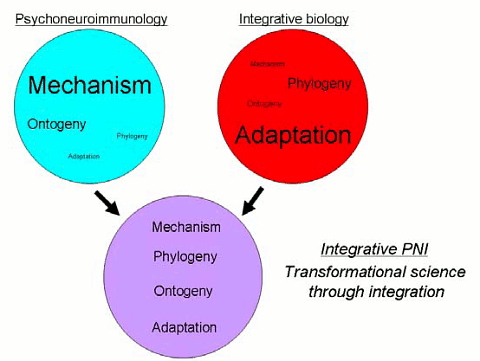SICB Annual Meeting 2009
January 3-7, 2009
Boston, MA
Symposium “Psychoneuroimmunology meets Integrative Biology”
Organized by: Lynn B. Martin II
One of the most important physiological discoveries in the last 30 years entails the interconnectedness of the endocrine, immune and nervous systems (Ader & Cohen 1975). Historically studied as independent entities, these systems work synergistically to promote individual fitness. For example, perception of an aversive stimulus can stimulate specific sympathetic nervous pathways to augment leukocyte movements, phenomena that both can reinforce or be reinforced by glucocorticoid hormones (Dhabhar & McEwen 1999). Such dynamic, complex interactions are the purview of the field of Psychoneuroimmunology, or PNI. To date, the predominant focus of PNI has been to understand this interconnectedness to improve human health (Glaser & Kiecolt-Glaser 2005), but much new basic biological insight is being provided by this emerging discipline.
Contemporary with the emergence of PNI are the fields of ecological endocrinology and ecological immunology (for simplicity, referred to as integrative biology (IB) hereafter). The goals of these fields have by-and-large been quite different than PNI. Predominantly, IB has sought to understand the benefits and constraints of hormones and immune processes in natural (i.e., evolutionary) contexts. Examples include the emergency life history hypothesis (Wingfield et al. 1998), whereby vertebrates redirect behavior to survive an unpredictable stressor via stress hormones, and the immunocompetence handicap hypothesis (Folstad & Karter 1992), whereby sexual trait honesty is maintained via the immunosuppressive effects of androgens.
What separates PNI and IB presently is best characterized by Tinbergen’s classic four perspectives on animal behavior (Tinbergen 1963). Tinbergen recognized that to understand fully any behavior, one must consider its i) mechanistic mediators, ii) ontogenetic trajectory, iii) phylogenetic history, and iv) adaptive value. As both PNI and IB have as a subject proximate  mechanisms specifically (i.e., physiology), an emphasis on this component is expected. Nevertheless, the extent to which the other three levels of investigation are addressed within each discipline differs dramatically. PNI tends to focus on mechanisms almost exclusively, rarely conducting studies in relevant evolutionary contexts. Conversely, IB tends to emphasize potential adaptive value of traits while ignoring mechanistic details. The two fields therefore entail strong but distinct proximate or ultimate biases (Fig. 1). Whereas both have been productive, a synergy between them should produce a complete picture of three integral physiological systems. This transformational perspective would enhance both PNI and IB.
mechanisms specifically (i.e., physiology), an emphasis on this component is expected. Nevertheless, the extent to which the other three levels of investigation are addressed within each discipline differs dramatically. PNI tends to focus on mechanisms almost exclusively, rarely conducting studies in relevant evolutionary contexts. Conversely, IB tends to emphasize potential adaptive value of traits while ignoring mechanistic details. The two fields therefore entail strong but distinct proximate or ultimate biases (Fig. 1). Whereas both have been productive, a synergy between them should produce a complete picture of three integral physiological systems. This transformational perspective would enhance both PNI and IB.
List of Speakers
S9.1 Tuesday, Jan. 6, 08:00 KELLEY, Keith W.*; DANTZER, Robert:
Inflammation: History and future of PNI and potential synergy with Integrative Biology
S9.2 Tuesday, Jan. 6, 08:30 PITTMAN, Quentin J:
Postnatal inflammation programs adult physiology
S9.3 Tuesday, Jan. 6, 09:00 DHABHAR, F.S.:
A Hassle A Day May Keep The Pathogens Away: The Fight-Or-Flight Stress Response And The Augmentation of Immune Function
S9.4 Tuesday, Jan. 6, 09:30 ADAMO, Shelley A:
The role of physiological constraints in psychoneuroimmunology
S9.5 Tuesday, Jan. 6, 10:30 KUHLMAN, Joshua R*; MARTIN, Lynn B:
Stress Effects on Immune Activity in House Sparrows (Passer domesticus).
S9.6 Tuesday, Jan. 6, 10:50 BAILEY, Michael:
Impact of stressor exposure on intestinal microbiota
S9.7 Tuesday, Jan. 6, 11:10 BILBO, S.D.:
Early life environment influences on neuroimmune interactions and behavior in adulthood.
S9.8 Tuesday, Jan. 6, 11:30 FRENCH, S.S.*; MOORE, M.C.; DEMAS, G.E.:
Ecoimmunology: The Organism in Context
S9.9 Tuesday, Jan. 6, 13:00 PRENDERGAST, Brian J:
Photoperiodic Regulation of Reproduction and Immunity
S9.10 Tuesday, Jan. 6, 13:20 GODBOUT, JP:
Neuroinflammation and behavioral deficits in the aged: Is microglial hyperactivity to blame?
S9.11 Tuesday, Jan. 6, 13:40 WEIL, Z.M.*; NORMAN, G.; DEVRIES, A.C.; NELSON, R.J.:

